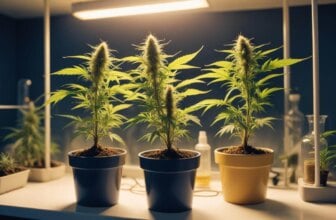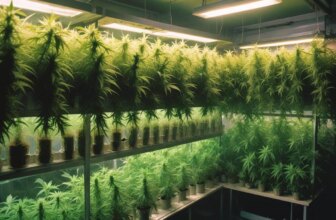South Africa’s approach to cannabis, commonly known as weed or “dagga” locally, has undergone significant transformation, mirroring a global trend towards re-evaluating cannabis legislation. Currently, the legal status of cannabis in South Africa is in a state of transition, reflecting a shift from stringent prohibition to more liberal policies. This change is not only a response to global trends but also a recognition of the unique socio-economic and cultural context of South Africa.
Key Takeaways
- South Africa has decriminalized the personal adult use of cannabis in private settings, marking a significant shift from previous stringent laws.
- Despite decriminalization, the sale and public consumption of cannabis continue to be illegal, reflecting a cautious approach to legalization.
- The legal landscape is still evolving, with the Cannabis for Private Purposes Bill pending finalization, which will further define the legal framework surrounding cannabis use in the country.
Historical Overview of Cannabis Regulation in South Africa
Cannabis, or “dagga,” as it is locally known, has been intertwined with South African culture for centuries. It was initially introduced through trade with Arab and Indian merchants. Its usage spanned medicinal, practical, and religious purposes, becoming a staple in many South African communities. However, the 20th century saw a drastic shift in its legal status.
Cannabis was first banned in 1928, aligning with a global trend of prohibition. This stance intensified with the 1971 Abuse of Dependence-Producing Substances and Rehabilitation Centres Act and the 1992 Drugs and Drug Trafficking Act, which criminalized cannabis and disproportionately impacted local cultivators dependent on the crop for income.
These laws remained until a groundbreaking 2018 Constitutional Court ruling declared sections of the 1992 Drugs Act unconstitutional, infringing on civil rights to privacy. This ruling, affirming the right to privacy, allowed for the decriminalization of private use and cultivation of cannabis by adults, signifying a major shift in the country’s approach to cannabis regulation. This change reflects evolving societal attitudes and acknowledges the plant’s historical and cultural significance in South Africa.
Medical Cannabis in South Africa: Legal Provisions and Accessibility
Medical cannabis in South Africa operates under the Medicines and Related Substances Act of 1965, as amended in 2019, and is overseen by the South African Health Products Regulatory Authority (SAHPRA).
Cannabis containing THC is classified as a Schedule 6 substance, necessitating registration with SAHPRA and a prescription from a licensed dispensary.
Patients must obtain a special permit from the SAHPRA and a valid prescription from their doctor to access THC-containing cannabis products.
Conversely, CBD is categorized as a Schedule 4 drug, available with a prescription for products containing less than 20 mg of CBD. Notably, there are no specific qualifying conditions for medical marijuana use in South Africa, and the accessibility of THC-containing cannabis products is limited due to the absence of licensed medicines. This regulatory framework, while a step forward, highlights the challenges and limitations in accessing medical cannabis in the country.
Current Legal Status of Recreational Marijuana in South Africa
The recreational use of cannabis in South Africa has seen a significant shift with its decriminalization for personal use in private by adults. Stemming from a 2018 Constitutional Court ruling, this change marked a departure from the previous criminalization of cannabis use and cultivation. However, the commercial sale of cannabis remains illegal, as does public consumption and transportation for sale.
Adults are expected to grow their own plants for personal use indoors or outdoors, reflecting a cautious approach to cannabis legalization. This decriminalization does not equate to a free-for-all scenario but rather a regulated environment where private use is tolerated within specific boundaries.
Possession, Cultivation, and Consumption: What’s Allowed in South Africa?
In the current legal framework, adults in South Africa are permitted to possess, cultivate, and consume cannabis in private for personal use. However, the exact limits on the amount one can grow or possess are still under legislative consideration.
The definition of “private premise” for cultivation purposes is yet to be fully clarified, leaving some ambiguity in the law. Driving under the influence of cannabis remains illegal, and workplace policies regarding drug use continue to be enforceable.
The legal landscape is in a state of flux, with the Cannabis for Private Purposes Bill expected to provide more detailed regulations and guidelines for cannabis use in the country.
What Future for Cannabis Legislation in South Africa?
The future of cannabis legislation in South Africa is on the cusp of significant development. The pending Cannabis for Private Purposes Bill is set to establish a comprehensive legal framework for the possession, cultivation, and use of cannabis. This bill is anticipated to address current legal ambiguities and lay the groundwork for a more regulated cannabis environment, potentially including provisions for the medical cannabis industry. As South Africa navigates these legislative changes, it is aligning with a global movement towards more liberal cannabis policies, reflecting changing societal attitudes and recognizing the plant’s historical and cultural significance.
To Sum Up
Is Marijuana legal in South Africa? The answer is nuanced. While the private use and cultivation of cannabis by adults are decriminalized, the sale and public consumption remain illegal. The legal landscape is evolving, with the Cannabis for Private Purposes Bill expected to bring more clarity and regulation. As South Africa navigates these changes, it joins a global movement reevaluating cannabis laws, reflecting changing societal attitudes, and recognizing the plant’s historical and cultural significance. For those interested in the topic, staying informed about the ongoing legislative developments is crucial.









